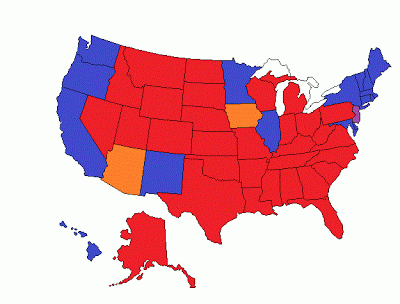In a move that has angered much of the public, the Prime Minister David Cameron had rejected proposals put forward by Lord Justice Leveson. To make matters worse for Cameron, he looks set to experience another humiliating defeat in the House of Commons as Labour will force a vote on the proposals. The vote should get the support of most of Labour and the Liberal Democrats as well as about 70 Conservative backbenchers. Unfortunately the vote will be non-binding as Labour does not have the power to introduce legislation.
So what is in the report causing such political angst? Well basically, Leveson calls for the setting up of a regulatory body that would be independent of both government and industry with the ability to fine organisations up to £1 million! The report castigates much of the press for their activities Leveson wrote that they have "wreaked havoc on the lives of ordinary people." Throughout the months that Leveson was listening to hundreds of testimonies, there were a number of specific stories that stood out. When Joanna Yates disappeared in 2010 her landlord, Christopher Jefferies was, in Leveson's words "the victim of a very serious injustice perpetrated by a significant section of the press". Leveson described the hunger of news organisations for stories on Madeleine McCann and her family as "insatiable." In most people's minds, it was the revelation that Milly Dowler, a murdered schoolgirl, had had her phone hacked by News of the World that started the avalanche of public anger that led to the Leveson inquiry. In July last year it seemed that barely a day went past when more people weren't added to the list of hackees. The families of 9/11 and 7/7 victims were hacked as well as those of dead soldiers and murder victims. The public revolution for the tabloids grew everyday.
The report was also critical of Jeremy Hunt and his handling of the BSkyB takeover bid. Hunt was at the centre of wider criticism of politicians' closeness to the press, particularly Murdoch titles. Leveson said that the huge amount of contact between Hunt's special advisor Adam Smith and News Corp lobbyist, Frédérick Michel was a serious problem that Hunt failed to address. Yet overall politicians were not heavily criticised notably Leveson cleared the government of being unfairly influenced by News Corp during the BSkyB takeover bid.
What happens in the next couple of moths will be of paramount importance to the nature of our press for the next generation. Parliament has a once-in-a-lifetime opportunity to stop the unethical and unnecessary excesses of the British press without harming free speech and with the support of the public. If Cameron rejects the idea, it will only be a matter of time until the 2011 press scandal returns in a new form.
So what is in the report causing such political angst? Well basically, Leveson calls for the setting up of a regulatory body that would be independent of both government and industry with the ability to fine organisations up to £1 million! The report castigates much of the press for their activities Leveson wrote that they have "wreaked havoc on the lives of ordinary people." Throughout the months that Leveson was listening to hundreds of testimonies, there were a number of specific stories that stood out. When Joanna Yates disappeared in 2010 her landlord, Christopher Jefferies was, in Leveson's words "the victim of a very serious injustice perpetrated by a significant section of the press". Leveson described the hunger of news organisations for stories on Madeleine McCann and her family as "insatiable." In most people's minds, it was the revelation that Milly Dowler, a murdered schoolgirl, had had her phone hacked by News of the World that started the avalanche of public anger that led to the Leveson inquiry. In July last year it seemed that barely a day went past when more people weren't added to the list of hackees. The families of 9/11 and 7/7 victims were hacked as well as those of dead soldiers and murder victims. The public revolution for the tabloids grew everyday.
The report was also critical of Jeremy Hunt and his handling of the BSkyB takeover bid. Hunt was at the centre of wider criticism of politicians' closeness to the press, particularly Murdoch titles. Leveson said that the huge amount of contact between Hunt's special advisor Adam Smith and News Corp lobbyist, Frédérick Michel was a serious problem that Hunt failed to address. Yet overall politicians were not heavily criticised notably Leveson cleared the government of being unfairly influenced by News Corp during the BSkyB takeover bid.
What happens in the next couple of moths will be of paramount importance to the nature of our press for the next generation. Parliament has a once-in-a-lifetime opportunity to stop the unethical and unnecessary excesses of the British press without harming free speech and with the support of the public. If Cameron rejects the idea, it will only be a matter of time until the 2011 press scandal returns in a new form.




